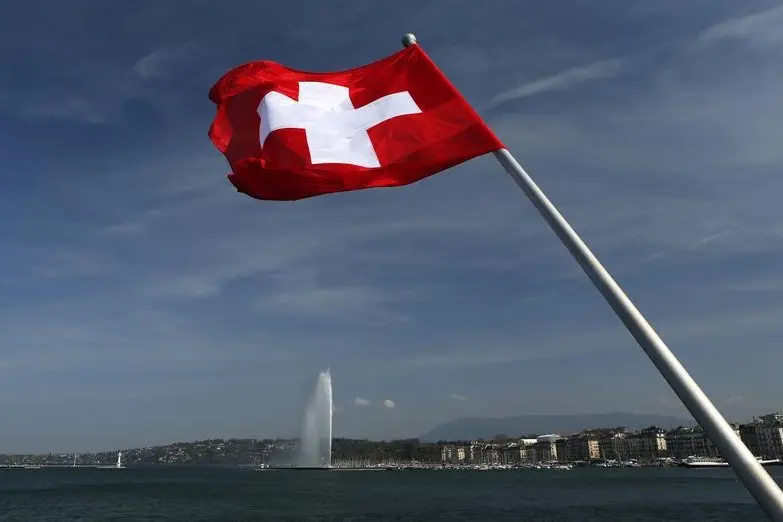PHOTO
Sunday, Apr 02, 2017
Damascus: With little surprise, the fifth round of UN-mandated Syrian talks in Geneva have failed, thanks to a multitude of unsolved problems between regional stakeholders in the Syria war and colossal differences between Syrian negotiators.
After chairing the last round of talks, UN Special Envoy Staffan De Mistura will be stepping down in mid-April, having failed, just like his predecessors Kofi Anan and Alakhdar Brahimi, at inching the Syrian conflict toward any kind of political endgame.
Word of mouth in Syrian political circles say that he will be succeeded by Sigrid Kaag, a Dutch diplomat who now serves as the UN Special Coordinator for Lebanon.
Neither camp is sad to see him go, and nor are the Russians of course, who have accused De Mistura of having “taken sides” in the six-year conflict.
When opening the talks on March 23, De Mistura hoped to discuss four “baskets” that had been agreed upon at the previous round in late February.
The first basket hoped to agree on a power-sharing formula between Damascus and its opponents, which according to UNSCR 2254, should be “comprehensive and non-sectarian.”
That was doomed to fail from the start, as the Riyadh-backed High Negotiations Committee (HNC) insisted on a Transitional Government Body (TGB) rather than a unity government, one that would take over completely from Syrian President Bashar Al Assad, rather than get signed off by Al Assad himself, as the Russians have insisted.
They have said that they are willing to share 50 per cent of its seats with regime figures, if Al Assad leaves, but this has been strongly vetoed by Moscow and Tehran.
The second basket was to discuss the Russian-penned constitution, which had been presented to Syrian negotiators at an earlier stage.
According to participants at Geneva V, it was the only serious topic on the conference agenda, being pushed for aggressively by Deputy Russian Foreign Minister Gennady Gatilov.
It keeps the regime in Damascus but grants far-reaching autonomy to different Syria cities and towns, calling for locally-elected parliaments in addition to a central one in Damascus, and gives these territories a share of their wealth and the right to elect their governors rather than having them imposed by Damascus.
It also diluted 23 of the president’s legislative powers, like naming the premier and governor of the central bank, but keeps his term at seven years and limits it to two tenures only, or a maximum of 14 years.
The third basket focused on “early elections” based on UNSCR 2254, without going into detail on whether they would be parliamentary or presidential, which is being flatly rejected by Damascus, while fourth basket covered “counter-terrorism.”
None of these issues were resolved, especially after Turkish-backed rebels of the Damascus countryside stormed the Syrian capital days before Geneva V kicked-off, sending a clear message to the Russians that neither they nor their Syrian allies were safe, and that they still had the ability to strike at the heart of fortified Damascus.
Syrian negotiators went to Geneva in battle rather than diplomat mode, more determined than ever before to grant no concessions — at their urging of their backers in Saudi Arabia, Iran, and Russia.
One notable development at Geneva V was the visible absence of the United States.
The entire process, after all, was the brainchild of former US Secretary of State John Kerry, who made it a point in attending all previous sessions of Geneva.
The fourth and fifth, however, were skipped by the new Secretary of State, Rex Tillerson, who came out with a thundering comment on 30 March, saying that the “long-term” fate of Al Assad was to be decided by the Syrian people.
He didn’t call on him to step down nor did he say that Al Assad had lost legitimacy.
Hours later, the US Ambassador to the United Nations Nikki Haley added “Our priority is no longer to sit here and focus on getting Al Assad out.”
On Friday March 31, a White House spokesman added that Al Assad rule was a “political reality that we have to accept.”
At Geneva V, representing the US was the Deputy Assistant Secretary of State, who “sat silently” throughout the first round “and walked out early” according to one participant.
“He was more of an observer than a stakeholder or participant, unlike Gatilov, who did all the bargaining and was calling all the shots.”
Explaining the American U-turn, Professor Joshua Landis of Oklahoma University told Gulf News: “Foreign governments have all but abandoned the rebels. Their defeat in Aleppo was the turning point.”
The editor of Syriacomment added: “Today, the Syrian government is well on its way to winning the war. Fighting will not be over this year, but the outcome seems all but certain.”
His views were shared by veteran US journalist Seymour Hersh, winner of the 1970 Pulitzer Prize, who also told Gulf News: “The Syrian government is recognised by the United Nations. It is time we stopped pretending that there is a solution to the civil war in Syria that does not include the Al Assad government.”
By Sami Moubayed Correspondent
Gulf News 2017. All rights reserved.





















